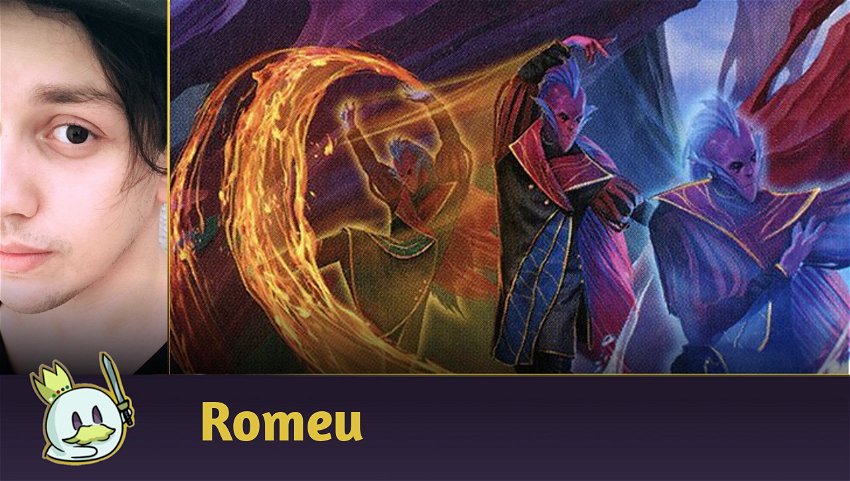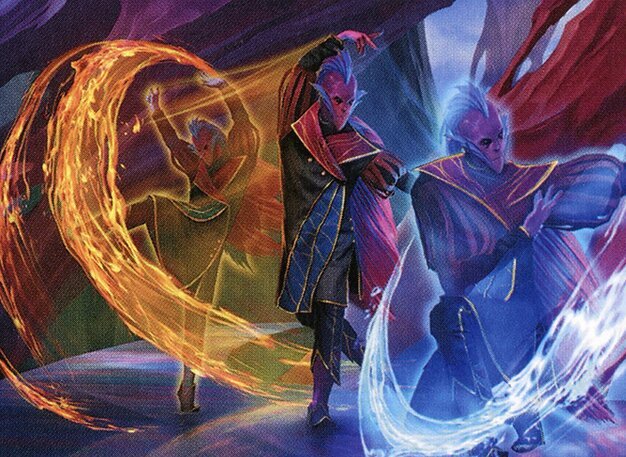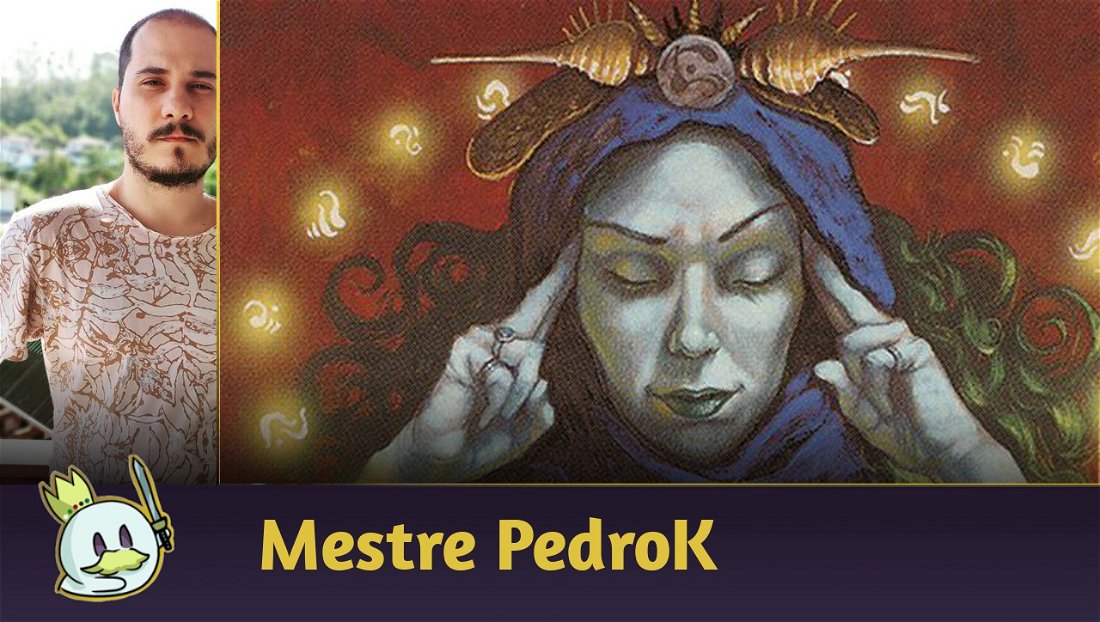In yet another sudden banned and restricted announcement, Wizards removed Winota, Joiner of Forces and Expressive Iteration from Pioneer just before the big start of the qualifier season for the first Pro Tour with in-person events around the world, which will have this format on the main stage.
How exactly will this affect upcoming major events and the Pioneer Metagame as a whole? Let's speculate a bit about the future, but first, we need to understand the nature of this direct intervention and what it might signal.
About the Bans
Winota, Joiner of Forces

When Winota was banned from Explorer, I commented that it would help gauge how healthy her presence was for Pioneer. After less than a month, we have the answer and the conclusion is that the format is better in its absence and improves the diversity of strategies in the Metagame.
As in Explorer, Naya Winota was the most successful strategy in Pioneer, involving a turn 4 Combo-Kill coupled with naturally efficient creatures that made it possible to act as a very consistent Midrange, burying your opponent in card advantage because literally all your threats generated some 2-for-1, making it impossible to play “fair” against it because you had to respect the combo every turn as it advanced its position with high-quality pieces. So, your best option was to dedicate numerous resources to fighting it (Rakdos Midrange, for example, does it masterfully), or to ignore it and try to be faster, like Lotus Field.
Which leads me, again, to point out that good hybrid combo archetypes will always break competitive formats — They are literally built to be difficult to answer and limit the diversity of viable strategies by presenting distinct plans that complement and force each other the format to respond too much, or just ignore them and try to be faster.
A combination of two or three cards alongside useful pieces inside and outside the combo makes it possible for a list to get the desired results with the fewest possible number of slots, giving you tons of flexibility and getting the means you need to play a "normal" Magic game while the combo works as a “free win” button and constant psychological dread.
We've already seen this story repeat itself with Dimir Inverter and Mono White Devotion, where both were able to mix their wincondition with situations where the matchup was extended, and you interacted directly with your opponent and forced them to make decisions that respected the combo too much, or accept the risks and be punished for doing so.
In summary, strategies like the ones mentioned above, and like Naya Winota, are the spectrum that work as Pioneer's Achilles Heel where, unlike the current Modern, the low mana efficiency in the traditional answers to these combos and the moderate power level don't allow the other archetypes to be ahead of them.
Hybrid combos are one of the most powerful things you can do in Magic: The Gathering and currently, Pioneer isn't even close to dealing with such a threat and its entire structure becomes extremely vulnerable when a deck with that proposal appears, causing the rest of the format to be forced to play around it.
So, the banning of Winota, Joiner of Forces might not be pleasant for many players, but it was definitely necessary, and as I've mentioned several times this year, removing Winota from Pioneer has always been a matter of when and not of if. And we finally reached the "when".
Expressive Iteration


That was precisely my reaction when I saw that they banned Expressive Iteration instead of Delve Spells, but that choice makes more sense if we consider the committee had specific targets in mind.
Izzet decks have been growing in representation in recent weeks thanks to the inclusion of the multi-format staple, Ledger Shredder, in Streets of New Capenna.
However, the history of these archetypes goes back a long time, and before the season where Naya Winota was the best deck, Izzet Phoenix held that title for quite a long time - thanks to the inclusion of three new spells: Expressive Iteration in Strixhaven, in addition to Consider and Galvanic Iteration in Midnight Hunt, making perfect sense because it and Izzet Prowess fit into another highly successful category in competitive Magic, Turbo Xerox.
Contextualizing in a simple and summarized way, Turbo Xerox was a concept created by Alan Comer in 1997, where he applies that the more cantrips you have, the fewer lands you need, you have more information from your top and access to the right cards when they are needed, and your late-game draws are better than your opponent's because you'll always have more actions to take.
Tempo decks, such as Izzet Delver in Legacy and Izzet Murktide in Modern, are extremely efficient precisely because they adopt this theory being accompanied by means to not put themselves behind in resources by obtaining card advantage and/or improving the card selection, such as Ragavan, Nimble Pilferer, or... Expressive Iteration.

In Pioneer, Tempo archetypes retain their card advantage, as cantrips only offer a 1-for-1 trade and that depletes their resources in the long run, with spells that offer a 3-for-1 for a low cost: Expressive Iteration and Treasure Cruise, and we know which of those options is the one that was banned in multiple competitive formats and compares to one of the most powerful spells from the Power 9.
But as someone who's played a lot with Izzet Phoenix in past seasons, I can honestly say that it's Expressive Iteration that lifted the deck to the top of the format and allowed it to stay ahead of the most famous graveyard hates that virtually renders Delve Spells useless — It literally allowed me to remove copies of Treasure Cruise in Games 2 and 3 because I still held my card advantage with only Expressive Iteration, Pieces of the Puzzle and, in more recent versions, Ledger Shredder.
Also, alongside the other cantrips, Iteration allowed the Phoenix player to significantly vary the amount of answers for the Metagame, with several one-ofs or two-ofs between the maindeck and sideboard. I've literally won local tournaments and done well in leagues with a copy of each removal, while my side was 90% made of singletons.
In taking this ban course, Wizards had an obvious target in mind: by removing Expressive Iteration, it also removes Izzet's ability to play around graveyard hate and still gain card advantage without slowing down their plans with the need to resort to counter-interactive options with its proposal, such as Planeswalkers, while other strategies that have Treasure Cruise and other Delve Spells remain intact and can continue to make up a significant portion of the Metagame.
In the announcement, they mention that they chose not to ban Dig Through Time and Treasure Cruise since these cards give Pioneer's blue decks a unique identity among eternal formats, being less efficient without fetch lands and powerful cantrips. But is that really true?
Azorius Control, for example, doesn't even run any of them, as Memory Deluge has replaced Dig Through Time, which is no longer among the most played cards by the archetype, but it appears in greater numbers in combos like Lotus Field and Esper Greasefang, as well as occasionally in Dimir Control.
It is evident that Wizards' proposal was to avoid further affecting the format's combos, since none of them have been showing an expressive winrate or dominating the Metagame lately.
If the fear was that Izzet Tempo would dominate the format in Winota's absence, the decision to ban Expressive Iteration was right. However, Delve is a naturally broken mechanic, and both Treasure Cruise and Dig Through Time have a troubled precedent in competitive formats, and any new cantrip, low-cost spell, or new ability that lets you fill the graveyard quickly, will be a threat alongside them, leaving these cards eternally on the threshold between “good for blue decks” and “absolutely broken”.
I emphasize, then, the same sentence I said about Winota: The relationship between Delve Spells and Pioneer is not a matter of if they will be banned, but when they will be banned.
As for Izzet decks, they will certainly survive this ban and resort to options like Chart a Course or Reckless Impulse, but they definitely lose in consistency without the most powerful Standard-legal spell released in the past year.
The Post-Ban Pioneer
With Winota gone and the notorious weakening of Izzet strategies, what can we expect in the coming weeks?
In case of emergency, go Red!
Mono Red Aggro benefits heavily from these bans, since Naya Winota was a terrible game, while Izzet Prowess was also not one of the most enjoyable matchups when the opponent had a flying clock as agile as yours and means to delay your plays every turn.
In addition, Mono Red always benefits when the Metagame is trying to develop and adapt to changes: it is the “fun police” that punishes any strategy that is too complicated to implement or aren't properly ready to face it between the maindeck and the sideboard.
If you're not sure what to play with now and want to hit the free-win button and punish bad deckbuilding options, Mono Red is your best choice!
It's time for other creature-based strategies.
Basically, any creature-based decks, from Selesnya Angels, to Humans, to Gruul Aggro, Golgari Stompy, and Vampires, and so on, were worse options than Naya Winota.
Now these archetypes will have some opportunity to reappear in the Metagame and adapt to the changes and context that each week may present to Pioneer, each with their pros and cons and good and bad matchups.
Lotus Field is the most absurd thing you can do right now.
Lotus Field is the most consistent and fastest combo in the format and was under a lot of pressure against Naya Winota. This ban gives it more time to plan the setup as needed, as most games involving it are a match between who is faster, or who plays better between their redundancy and opponents' disruptions such as Thoughtseize.
Particularly, I see this deck as extremely problematic in the long term, but it follows exactly the pattern that a combo should follow in Pioneer (little interactive, pieces focused solely on its execution) and, as long as there are efficient counterweights that prevent its predominance, I believe that keeping it in the format is acceptable.
If you want to go for the hybrid combo, Greasefang is your best friend.
If I've learned one thing from watching and playing Explorer over the past few weeks, it's that the current best combo hybrid option is Greasefang, Okiba Boss and Parhelion II, as they also need very few pieces to operate well while opening slots for interaction and alternative game plans, but being much easier to respond to than Naya Winota ever was.
I've been playing frequently with many variants of this strategy in Explorer on Magic Arena, including versions less dependent on the combo, following a Midrange route while threatening 13 flying damage and 12 power on the board suddenly if the opponent doesn't respect this possibility, you can check my Obscura Greasefang Deck Tech for Explorer, it might have some use in the "new" Pioneer now, and Dig Through Time definitely helps.
Another strategy that can grow in this category is the combination of Lukka, Coppercoat Outcast and Titan of Industry, but I believe that some adjustments will be necessary to make it less linear, as its current composition looks like a worse variant of what Mono Green Devotion attempts to do, trading speed for a much worse topdeck, which is easily punished by my next prediction:
We should pay attention to Rakdos Midrange
After Winota was banned from Explorer and the rise of Mardu Greasefang, Rakdos Midrange has established itself as the best deck in the format for being great against creatures and slower combos in the maindeck, while its sideboard is incredibly efficient against Control, putting it in the even matchup against most strategies, and I believe in the possibility reproducing the same result in Pioneer.
Thoughtseize is also better in the absence of Iteration and Winota because cheap card advantage and the very combo-kill composition with efficient Midrange backup made targeted discards much worse than they should be. Without them, Thoughtseize becomes more important as it starts to remove key pieces of decks that could easily ascend in the coming weeks.
The problem with Rakdos Midrange on Pioneer is that it has the great challenge of being able to play well against archetypes where Thoughtseize and removals followed by Planeswalkers are usually not enough — the famous “go big” or “big mana” like Mono Green Devotion and the Niv-to-Light.
What about Explorer?
Izzet Phoenix is one of Explorer's main competitors, but it doesn't have Treasure Cruise and the like as they haven't been added to the format yet.
Without Expressive Iteration and lacking useful replacements, I'm guessing Izzet Phoenix won't be able to maintain its Tier 1 position, and will likely drop to Tier 2 and perhaps make room for the Prowess variant, which can rely on more proactive spells like Light up the Stage and Reckless Impulse, but it probably won't be enough to occupy a space at the top either.
Conclusion
At the end of this article, I conclude that the 7th June Banned & Restricted Announcement will definitely change Pioneer, just a few weeks before the start of the Qualifiers. It is a good time to immediately start evaluating the available options and experimenting with the many viable strategies and their variations as we seek to adapt to the great unknown that this sudden change has brought.
Regarding the format's health, I believe that both bans were accurate and open space for the diversification of the competitive scenario.
If you have any speculations or observations to make about the future of Pioneer and how the absence of two of its main pillars could change it, feel free to leave them in the comments.
Thanks for reading!













— Comments 0
, Reactions 1
Be the first to comment